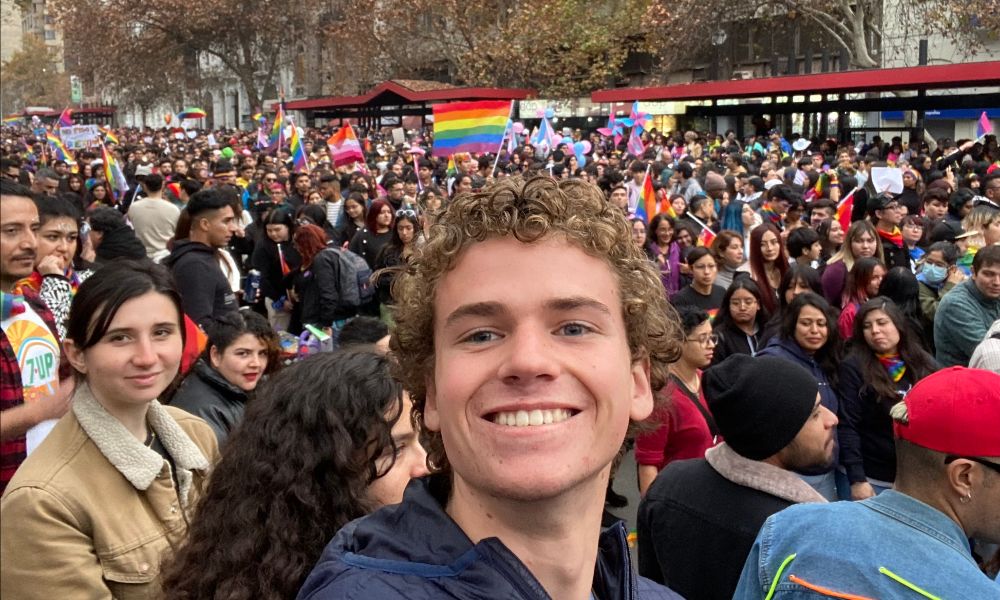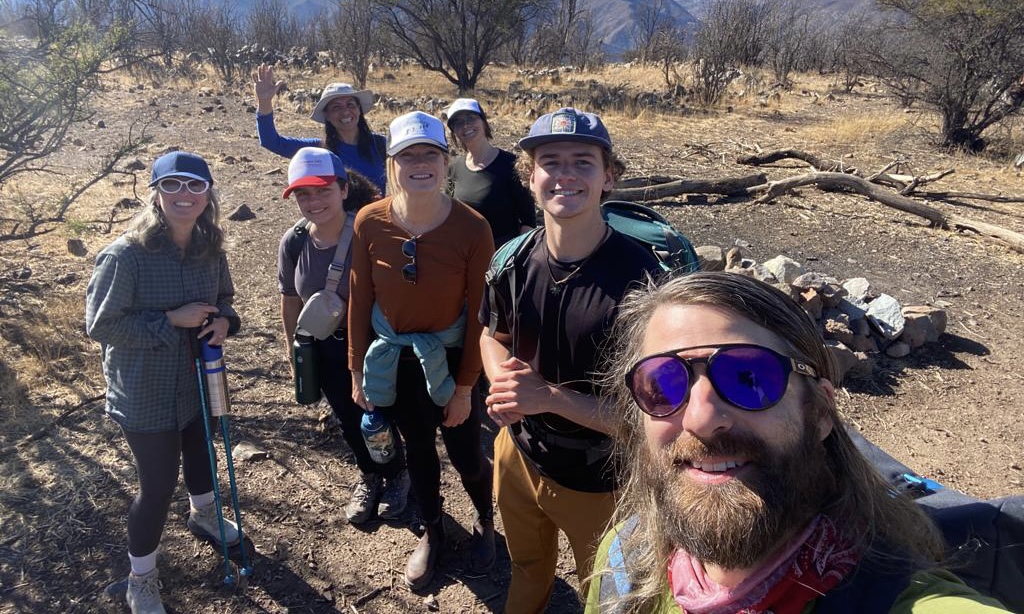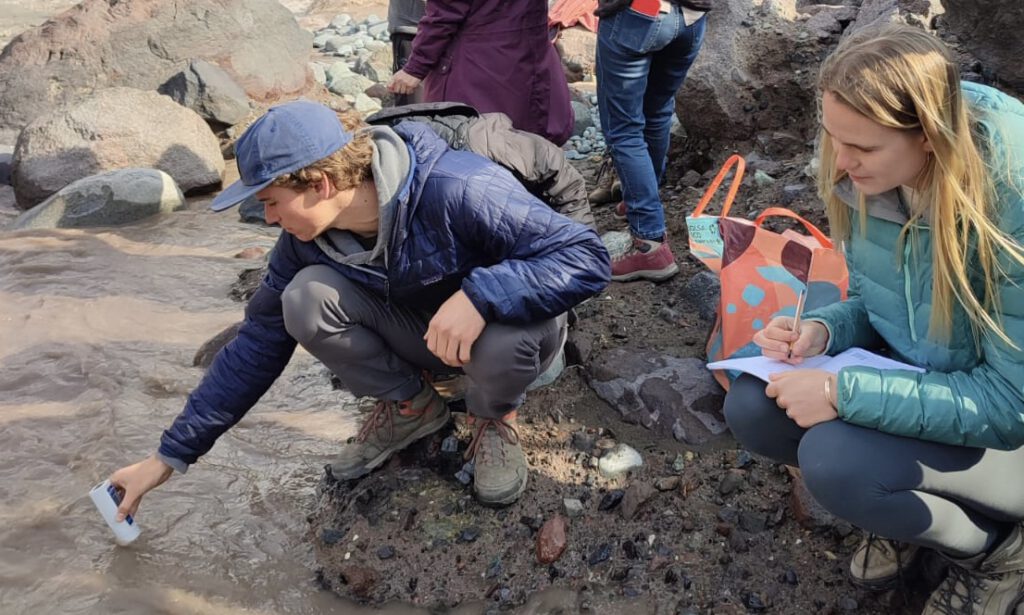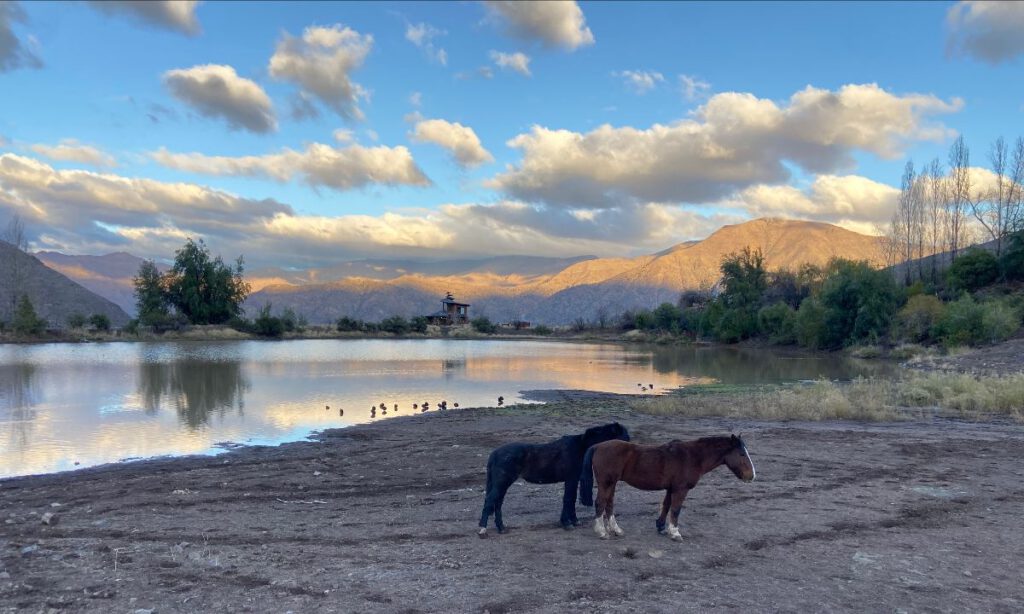If you want to know what I’m actually doing in South America, this is where you can keep up. If you’re content just picturing me 5,000 miles away standing on a pile of rubble holding the Communist Manifesto and smelling like menthol cigarettes, I applaud your intuition and invite you to spare yourself the gritty details of revolution. But, if you’ve got a taste for adventure, social science, and ten minutes of free time, here’s my life as of late.
Early Friday morning I touched down in Santiago de Chile, the capital of the longest and skinniest country in the world. Chile is currently in the process of rewriting its Constitution, prompted by decades of extreme social inequality, destructive resource extraction, and superexploitation in its precarious labor market. I arrived on the tail end of the country’s most intense rainstorm in decades, which flooded homes and shut down city transport. Of special interest was a refrigerator spotted floating down the Río Maipo, among literal tons of garbage the overflowing river swept up. The fridge epitomized many Chileans’ anger at the lack of protection for parks, rivers, glaciers and natural resources in the country, which are largely owned and managed by private companies. The washed-up appliance was also a vehicle of blame for Chile’s middle class, who pointed fingers at Venezuelan immigrants, shantytowns and a lamentably “declining culture” for the country’s disarray.
After napping for the entirety of my first day, I took the metro downtown for Santiago’s Pride parade, which featured rows of fried street food, a drag show, and an 18-wheel DJ booth.


Santiago is my Home Base for the next three weeks, but I’ll be spending most of my time in surrounding agricultural areas to understand how farmers, government officials, and community figures are responding to climate change, especially chronic drought. Our research team is a motley of UCSB and Chilean students and professors, though it has become a rotating door with Citizen Scientists, park managers, and local activists leading and accompanying our endeavors.

Our first destination was Calle Larga (long street), named after a remarkably short, narrow road running through the rural municipality. During my four days here, I woke up at 8am to swallow ham and cheese on Wonderbread before driving into the hillside to interview the likes of Don Victor, whose farm plot included a nauseating-but-fertile Microbe Bucket and 95%-retention irrigation system.
Experimentalists like Don Victor are key for developing and sharing new methods of fertilizing, irrigating, and pest-proofing plants, which are often rejected by more traditional cultivators. Agricultural knowledge is primarily passed down by generations of farmers, who see little incentive to depart from the techniques of their parents and grandparents. Yet with a rapidly heating and drying climate, these cultural practices are running up against environmental limitations. Future water policies must account for tensions in government initiatives and farmers’ personal networks to adequately address their needs and mitigate damage from monocultural export operations.


Policy Bite
Before visiting Calle Larga, I had wholehearted faith in market-based incentives to achieve environmental controls, but the situation in rural Chile throws many of those systems’ fundamental assumptions into question. The “cap-and-trade” format, for instance, involves distributing rights to a resource in the form of permits, which can be subsequently bought and sold between individuals and companies. Water rights were distributed in a similar way roughly 40 years ago in Chile, allowing permit-owners to receive a percent of flow from a nearby river. Farmers are free to sell their rights, Dole is free to buy them, and everyone is happy.
One main oversight of Chile’s cap-and-trade framework is that it assumes water is only valuable to humans, and disregards its role in sustaining other ecosystems. Until very recently, Chilean law declared that if you didn’t use all the water provided in your rights, you were subject to lose them. This policy, which has incentivised overconsumption since the 1970s, illuminates a fundamental problem with commodifying natural resources, since they can only conceptually exist in relation to humans’ immediate material interests. This issue was exacerbated in Calle Larga, since rights to the local Río Aconcagua’s flow were initially overdistributed, leading to conflicts among permit-holders and leaving the river bone dry for native plants and animals. These impacts also play out in important social and cultural dimensions; for instance, those displaced by drought are overwhelmingly poor and Indigenous, and the hillside is no longer viable for ranchers who have grazed and lived on the land for decades. The threat of cultural erasure reflects market policies’ tendency towards a narrow interpretation of value and rights that marginalizes and impoverishes certain social groups and identities.
Chile’s most recent solution has been to offer citizens the option to set aside some water “for the Environment,” eliminating the shortsighted use-it or lose-it policy. Yet even with this Green alternative, I argue that the market-based approach to natural resources is structurally deficient and must be accompanied by extensive social and environmental protections. The entire thrust of the ecological perspective is that we should take a holistic view of the environment, and center how the well-being of different plants, animals and resources mutually reinforce one another. Chile’s water management, especially with the Green adjustment, makes responsibility for the environment granular, transactional, and self-interested. The framework of “sacrificing” a portion of your water rights for an intangible personal benefit—moral reassurance or environmental brownie points—does nothing to challenge or balance cap-and-trade’s underlying value system. Markets are indeed fantastic at efficiently determining the value of resources, but we must be critical of how that value is established in the first place. After my time in Calle Larga, I am more skeptical of the potential for market systems to address fundamentally ecological questions; at the very least, such systems must be accompanied by truly ecologically-centered policies that acknowledge the value of resources when they aren’t extracted by humans.
Sobre Todo
This trip has been different from all others because I’ve been knocked out of the orbit of tourism. More than-off-the-beaten-path, field work is a new layer of immersion. It’s teamwork and it’s refreshing. It’s a reminder of why I spent so much of the last 3 years reading about this wonderful massive continent, and it’s a joy to see, feel, and live in it again.
If you made it this far, I hope you enjoyed! I hope to send these out periodically, if nothing else to force myself to put finger to keyboard and hit send. Until next time!
Lucas